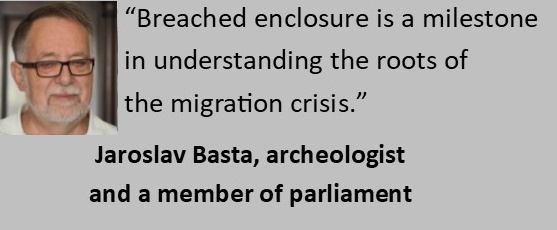So we know the distribution of power, but who gives the orders? Very few people have the ability to give a direct order if it would conflict with many surrounding interests. And no one has the ability to give an order that is directly contrary to the surrounding interests. Emperors and sultans in the past have seen this killed by their own palace guards.
Court of Louis XVI, not King Arthur
Much more likely we can speak of the rule of an irrational mob, albeit a mob composed of the rich and the intellectual. And we know enough about mob psychology. This also explains the totally irrational actions of not only Western governments but also many corporations. Although many observers are trying hard to find some purpose in this, they are failing. What did the Americans gain by going to Afghanistan? What did the car corporations gain by supporting the environmental madness?
Emperors and sultans in the past have seen this killed by their own palace guards.
In my book Breached Enclosure, I call these people the new aristocracy. I argue there that with the growth of bureaucratic organizations and the formation of the elite, the old division between the royal court and the people has gradually been restored. The courtiers are different from the rest of the people. Of the many royal courts of different times, perhaps the courts of the last French kings serve us most vividly. Flamboyant luxury, perfumed wigs, statues of shepherdesses, refined manners and endless intrigue. Maintaining a position in such a royal court was not easy. One mistake and one became the subject of gossip, fell into disfavor and eventually had to leave the court. Thus, very special skills were needed to maintain one’s position. It didn’t matter whether one was a good manager of one’s farm or how well one did in battle. What was valued was the ability to intrigue, to plot, to choose the right “friends” and quickly abandon them, to flatter influential people, to show unscrupulousness and to demonstrate loyalty and correct opinions at all times. All of this required a very powerful brain and also a character trait that we might very politely call “adaptability of opinion”. Conversely, people of combative and firm principles were disqualified in advance. The royal courts of the late Louis were no place for real soldiers.
The new aristocracy is absolutely international. Its language of communication is English, and its members do not declare themselves to any nation.
Exactly such an environment is replicated today in the glass palaces of corporate headquarters, ministries, the headquarters of multinational NGOs or organizations such as the European Union, the World Bank, the United Nations, and so on. In a world of men’s suits, pantsuits and powerpoint presentations. If such a claim seems far-fetched to you, take a look at any of the many thousands of booklets on how to be successful in a job (read: how to be successful in the upper echelons of a bureaucratic organization). You won’t find advice there on how to do your job well. They focus exclusively on where to sit in a meeting to get noticed by senior managers. How to choose your friends. Which phrases to utter during a presentation. How to dress most appropriately. Or give a few hours to scrolling through your LinkedIn posts. You’ll quickly see that the entire craft of a senior manager is just two things. First, to perfectly gauge the distribution of power. Second, ingratiating yourself with the right people. Is this any different from the decadent royal courts?
The psychology of the new aristocrats
What is typical for this group? Apart from the fact that it is one coherent group running across organisations (as we have already mentioned), in particular the following:
- The new aristocracy is absolutely international. Its language of communication is English, and its members do not declare themselves to any nation. They are not at home anywhere, they have no relations with any country.

- Its members have very powerful minds. When we see the results of the work of, say, the European bureaucracy, we tend to think that imbeciles work there. But no! They are very successful at the most important thing – raising budgets and strengthening their own position. Life in a bureaucratic system is a life of constant scheming and playing complex power games. This requires a brain capacity comparable to playing several complex chess games at the same time. After all, the results of IQ tests, or American SAT tests or PIAAC tests confirm the same.
- What they are better at in brainpower, the elite lack in other areas. Courage, the ability to say things openly, masculinity, a sense of responsibility… these are not qualities that lead to success in the intriguing environment of royal courts or at the top of modern bureaucracies. When you read a successful corporate supermanager in a magazine interview talking about perfect performance, know that he actually excels in very different areas – judging who to suck up to and who not to; throwing in the right flattery at the right time, taking credit for someone else’s work and blaming failure on someone else. It is no coincidence that experience in the communist secret police was a prerequisite for becoming a manager in American technology companies in the first years after the Velvet Revolution in the Czech Republic. People of similar personality traits get to know each other quickly.
When we see the results of the work of, say, the European bureaucracy, we tend to think that imbeciles work there. But no!
- They are distinguished from ordinary people not only by wealth and power, but above all by lifestyle. Fifty years ago, it was the case that members of the upper and lower classes shared the same ideas about life, family, raising children, sex, leisure… They differed then basically only in that some could afford bigger cars and bigger houses, while the others had to cut back. But today they are groups with a different culture, a different idea of life, different ideals, different standards of right and wrong.
- As we have said, membership of the super-bureaucratic elite is largely hereditary. But the primary issue is not that there is any confirmation of princely descent, but the ability to rise up within the bureaucratic system. Brain power (let’s not forget that it’s still the chess) plays a role, as do habits, taste in art, and more. What this means in practice is that when children born to members of the new aristocracy come into the world with better inn
 ate aptitudes, they receive a more suitable upbringing, a more stimulating environment, a more stable family (this may come as a surprise, but members of the new aristocracy divorce less often than members of the lower classes), better education… so that when it comes to the entrance exams to elite schools, the children of the lower classes can’t compete with them. They can’t compete with them in the tenders of global consulting firms, nor, for example, in the struggle for positions of power in non-profits and government.
ate aptitudes, they receive a more suitable upbringing, a more stimulating environment, a more stable family (this may come as a surprise, but members of the new aristocracy divorce less often than members of the lower classes), better education… so that when it comes to the entrance exams to elite schools, the children of the lower classes can’t compete with them. They can’t compete with them in the tenders of global consulting firms, nor, for example, in the struggle for positions of power in non-profits and government.
But few members of the bureaucratic elite would openly admit what we are so openly and cynically describing here. In fact, they spend enormous energy to maintain the notion that their work is extremely important, they display enormous efficiency, they are extremely useful to all of humanity, and only limited nationalist rednecks do not understand what a corporate manager actually takes money for. The hardest part is convincing oneself of this (the author of this article is a former corporate senior manager, so he knows exactly what he is talking about), besides spending millions and billions on propaganda and of course on suppressing independent thinking that might challenge the relevance of bureaucratic systems. But do try talking to someone who has succeeded in such an environment but is now perhaps retired. You will learn incredible things from him.
They spend enormous energy to maintain the notion that their work is extremely important, they display enormous efficiency, they are extremely useful to all of humanity…
Note that we are not developing a conspiracy theory. We’re not talking about a conspiracy. We’re just stating how the social structure works. Many are able to benefit from such a situation and are therefore strongly motivated to continue to support it. But that does not necessarily mean that it was built deliberately.
This makes the picture we present all the more bleak. There is no centre whose removal would lead to a remedy. Nothing less than a change in the entire socio-economic system will help. We, the former citizens of the Soviet bloc countries, know something about this.


